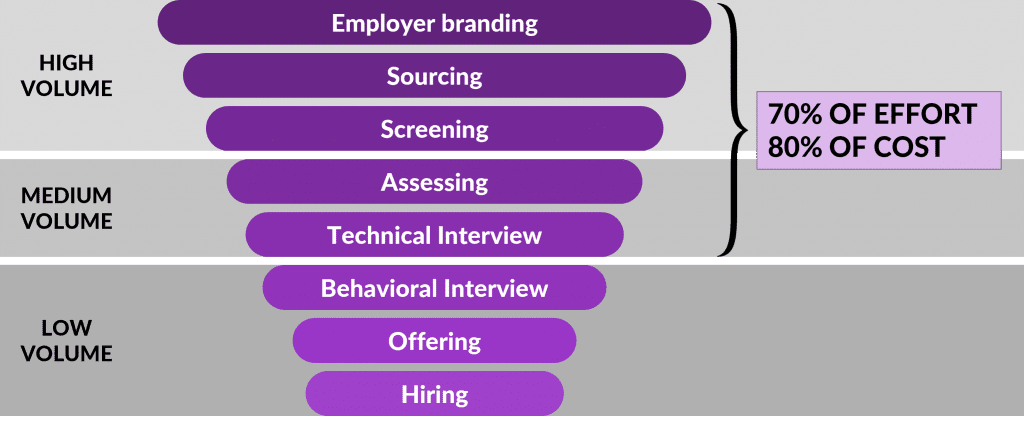The digital transformation we are currently experiencing directly impacts the recruitment sector, especially in the technology field, shaping a new landscape that redefines traditional practices. Automation and artificial intelligence, in this context, emerge as driving forces that promise to revolutionize the way we approach Tech Recruiting forever.
The rise of automation and AI in the selection process represents a crucial milestone. Automated tools, powered by advanced algorithms, now play a fundamental role in resume screening, identifying essential skills, and efficiently conducting preliminary interviews. This operational refinement not only speeds up the process but also introduces a data-based impartiality component in candidate evaluation.
Artificial intelligence emerges as a true revolution in Tech Recruiting. Machine learning algorithms have the unique ability to analyze vast datasets, providing an evaluative and predictive insight into a candidate’s potential success. This predictive power not only optimizes talent selection but also contributes to more robust retention strategies by anticipating challenges and proposing proactive solutions.
Tech assessment platforms increasingly play a crucial role as an innovative tool promising to revolutionize how talent is assessed and recruited. As technology advances, the traditional resume-based approach is gradually being replaced by more dynamic and objective solutions. These platforms use advanced algorithms and AI to analyze skills, competencies, and performance in simulated situations, offering a more accurate and comprehensive assessment of a candidate’s potential.
Unlike conventional resumes, which often reflect only a candidate’s past professional experience, tech assessment platforms allow for a more holistic analysis of skills and competencies relevant to a specific role. This shift from focusing on history to actual performance capability provides companies with a clearer insight into how candidates can adapt and thrive in specific work environments. Additionally, these platforms have the ability to identify transferable skills and growth potential, making the recruitment process more future-oriented.
Another crucial benefit is the minimization of unconscious biases in the selection process. Tech assessment platforms base their assessments on objective data and measurable metrics, reducing the likelihood of decisions influenced by biases. This contributes to a fairer and more diverse selection, opening opportunities for talents that may have been underestimated in conventional recruitment processes. As these platforms continue to evolve, the gradual replacement of resumes by more accurate and performance-oriented assessments is expected to become increasingly common in the corporate world.
The reduction of operational costs is one of the first rewards organizations experience. Automation simplifies routine tasks and consumes fewer resources, allowing for a more efficient use of time and recruitment team efforts. This not only results in financial savings but also frees up valuable resources that can be reallocated to more strategic and growth-focused activities.
The recruitment funnel presented below demonstrates the approach used by most companies in a traditional tech recruitment process. The initial stages, involving high and medium levels of resume and candidate analysis effort, also represent an average of 70% of the time and up to 80% of the total cost spent by the recruitment team. Through assessment platforms, it is already possible to automate a large part of the processes involved in the top and middle of the recruitment funnel, so that more repetitive activities such as sourcing, initial screening, and technical evaluation of tech talents are done entirely automatically.


Using beecrowd platform as an example, competitive programming contests and technical assessments are used to perform technical screening of thousands of candidates in a few hours. In a developer recruitment process for a company in Eastern Europe, for example, the platform was able to assess the software development skills of over 1000 candidates in just 5 hours, with extremely high levels of accuracy and without the risk of unconscious bias. Candidates who pass the screening are taken directly to the final stages of the recruitment funnel, increasing the quality of the process while saving recruitment time and effort.
Organizations that successfully adopt new automated processes like these are reaping significant rewards. These benefits, though tangible, are just the tip of the iceberg. The technological revolution in Tech Recruiting is not just about operational efficiency: it’s about empowering organizations to build exceptional teams that drive innovation and achieve more ambitious goals.
However, as with any revolution, there are inherent challenges. The delicate balance between efficient automation and preserving human empathy and understanding is crucial. Additionally, ethical issues related to data management require special attention to ensure candidate trust and compliance with regulations.
Tech Recruiting is at the epicenter of an irreversible transformation. Automation and AI are not just tools, they are catalysts for a complete change in the approach to recruiting tech talents. This is a unique moment where organizations can forge a smarter, more strategic, and talent-centric future.



